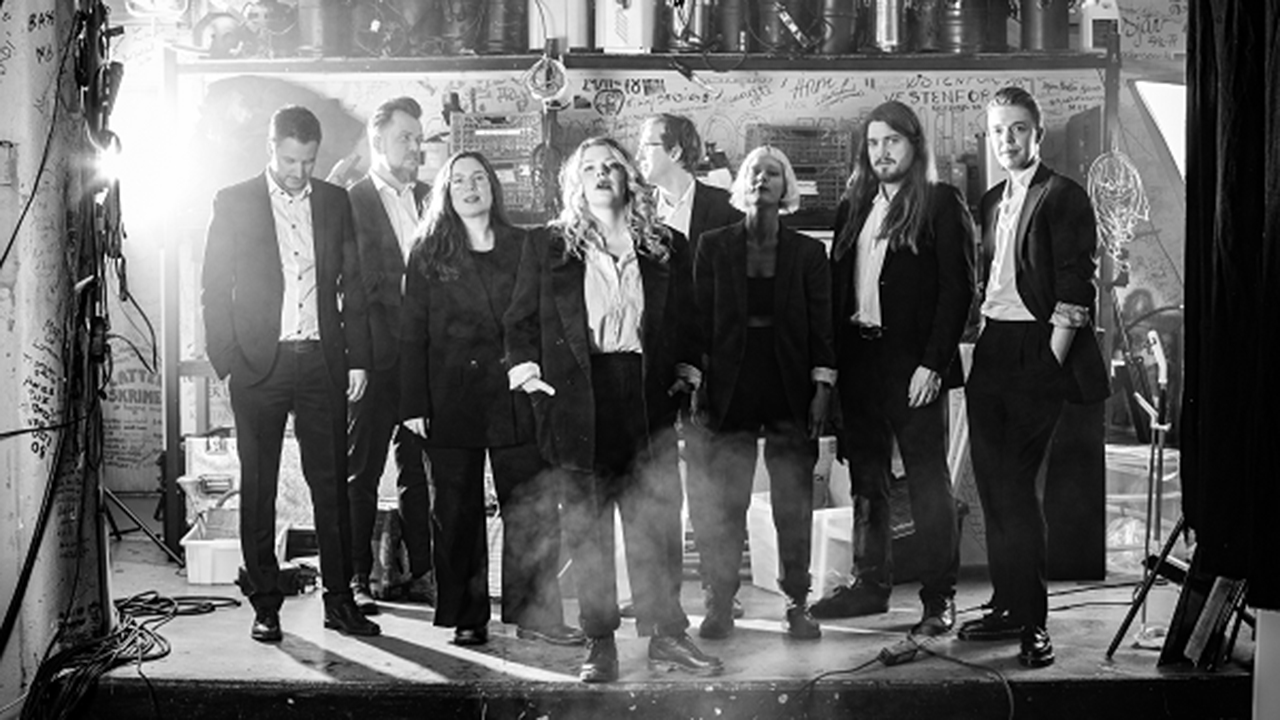
Prog Meer were playing in Germany a couple of years ago when a man came up to them after the show. “He wanted to thank us, but he started crying,” says co-vocalist Johanne Kippersund Nesdal. “And he just cried and cried.
He said, ‘You are making me do this.’ Getting that kind of reaction from a grown man makes you realise that your music is impacting people’s lives.” It’s not surprising they provoked such a reaction.
The Norwegian eight-piece’s music is big in every sense: melodically, emotionally, dramatically, marrying the intricacy and grand sweep of modern prog to the accessibility of pop. Even their name is a play on ‘Mer’ – the Norwegian word for ‘more.’ “We always want more,” jokes Eivind Strømstad, Meer’s guitarist and also Johanne’s husband.
The pair are speaking from a room in the theatre that Nesdal and her brother and co-vocalist Knut’s parents own in the lakeside town of Hamar, 90 minutes north of Oslo (current productions: a summery spin on Shakespeare’s and a version of ). Nesdal and Strømstad both work there. “He married into the family business,” says the singer.
Appropriately then, there’s a sense of drama to Meer’s third album, . The uplifting rush of their music is powered by the Nesdal siblings’ distinctive voices: Johanne’s powerful and soaring, Knut’s lithe and melodic. The latter came fourth in the Norwegian heats for Eurovision in 2014.
“We both love to sing, but he’s more into the glam, TV stuff than I am,” says Johanne. doesn’t exactly set its sights on Eurovision, but it does come with an unashamed desire to balance complexity with catchiness. “We wanted to write songs that people would have fun singing along with,” says Johanne.
“Some of the songs are a little more pop-rocky. You can dance along to them.” Sign up below to get the latest from Prog, plus exclusive special offers, direct to your inbox! The singer was weaned on her parents’ classic rock CDs – , , , .
She sang in a cover band as a teenager, but remained oblivious to the modern prog scene until Meer signed to influential Norwegian label Karisma for their second album, 2021’s . By contrast, Eivind was a full-blooded prog metal fan: and were favourites. “Then I had a period where I pretended to be into jazz,” he says wryly.
“If you want to study music, you have to.” I was actively trying not to make prog music early on in the band. But that music is part of who I am Such is the breadth of that all of those influences are evident, together with everything from Ennio Morricone to acclaimed British singer- songwriter Michael Kiwanuka.
“With eight people in the band, there are eight sets of different musical influences,” says Johanne. Elvind adds: “Because I was a certified prog-head in my teen years, I was actively trying not to make prog music early on in the band. But that music is part of who I am.
” Meer literally grew up together. Of the eight members, seven met at high school in Hamar: Johanne, Knut and Eivind, plus violinist Åsa Ree, viola player Ingvild Nordstoga Eide and drummer Mats Lillehaug were students; while pianist and keyboard player Ole Gjøstøl taught there. They’ve known bassist Morten Strypet almost as long.
The seeds of Meer were sown in the late 2000s, when Nesdal and Strømstad began playing together as a jazzy acoustic duo under the ungainly name Ted Glen Extended. “How jazzy?” says the guitarist. “Well, there were saxophone solos.
” They began to accumulate members, and by the time they released a self-titled EP in 2012, the line-up numbered eight musicians – impressively, the same eight who remain today. The name change came about when they were working on their debut album. “We realised our original name was stupid and no one could remember it,” says Eivind – not incorrectly.
The self-titled full-length record, independently released in 2016, presented a sonically compact version of the Meer of today. “It flew so far under the radar it was impressive,” says the guitarist. “It got two reviews and then nothing happened.
” It’s about seeing the world as an adult...
and longing to go back to a childlike state They both laugh about it now, but it wasn’t funny at the time. “When you work hard on something and you want to show it to the world, it’s disappointing when no one hears it,” says Johanne. They’d started recording their second album shortly after the debut was released, but when vanished without trace, they took their foot off the gas.
“We didn’t feel like anyone was waiting for it,” Johanne adds. “I don’t think we were driven in the way we are now.” was finally released in 2021.
It was worth the wait. It sounds much more confident than the debut, and closer in sound and ambition to where Meer are today. “We were just better musicians – we’d played more together; we were growing as performers,” says Johanne.
“That takes time.” sounds like the work of a band operating at peak confidence. It was recorded at Ocean Sound Recordings, a live-in studio on the remote Norwegian island of Giske, previously been used by and .
“You can totally separate yourself from society,” says Eivind. “You live in a bubble.” Johanne: “It was a beautiful setting, You can dive right into the ocean and taste the salt.
” Eivind looks unimpressed: “It’s really cold.” While the rest of the band worked at Ocean Sound, Johanne went on long walks, come back, sit in the kitchen and write lyrics. A main theme of the album, she says, is the concept of the loss of innocence.
“That feeling of seeing the world as an adult. And the experience of being a human in the fucked-up world we live in, seeing all the crazy mechanics, the wheels within wheels – and longing to go back to a childlike state.” That push-pull between the grown-up and the childlike is there in the deceptively euphoric , a song “about the feeling of addiction, of wanting something more all the time.
” I just try and keep the peace. There are explosions, but we can laugh about it Elsewhere, there are musical Easter eggs for those familiar with Meer’s back catalogue – references two songs from Playing House: and . “We like to build musical themes and recycle ideas to make new songs,” says Eivind.
With eight people in the mix, it must take a deep well of patience and the interpersonal skills of a high-level diplomat to keep the peace. “There was a quite a lot of tension early on, but we’ve got pretty good at working together,” says Eivind. Johanne agrees that they now “know which buttons not to press: where not to go.
But there are times when I’ve been sitting for hours in rehearsal doing nothing and thinking, ‘Oh my God, this will never work.’” There are two distinct and potentially conflicting dynamics at the heart of the band: one married couple, one pair of siblings, with Johanne in the middle of that particular Venn diagram. How do they keep things from exploding? “It’s normally me and Knut who do most of the arguing,” admits Eivind.
“I just try and keep the peace,” says Johanne. “There are still explosions, but we can laugh about it.” The downside of having a bigger-than-average head count is that it puts a limit on touring.
Meer have played club shows in the past, but hitting the road for weeks at a time is virtually impossible due to eight different sets of commitments. Instead, they’ve focused on playing festivals over the last couple of years, an approach helped by the growth of the Norwegian prog scene in the last 10 years. There are small festivals all around the country.
.. for us it’s been a game-changer “We didn’t really consider ourselves prog, but people said, ‘Hey, come and play our prog festival,’” says Johanne.
“There are small festivals all around the country and in places like Germany and Holland. The community is not that big but it’s passionate. For us it’s been a game-changer.
” Meer are paying it back in terms of the Norwegian prog scene. Last year they put on their own festival, Pulterkammer, held at the Nesdal family theatre and headlined by and Meer themselves. They’re staging it again this September, with a line-up that includes Kristoffer Gildenlöw, Seven Impale and Aiming For Enrike.
Meer will be appearing twice. “It’s a two-day party in our living room,” says Johanne. “We have this dream of making it a regular ‘Meer and friends’ event.
” Staging your own festival in your own theatre is admirable in its ambition, and it sums Meer up: think big, want more. Jethro Tull share new 2024 remix of Jack Frost And The Hooded Crow “Pink Floyd weren’t available. Jon Lord turned it down.
So it came my way”: Roger Glover made an unexpected success of the soundtrack to a movie that never happened – but was it prog? "We’re so excited to show you what we’ve been working on." Horsegirl announce new album Phonetics On and On, share first single 2468, reveal US tour plans Dave Everley has been writing about and occasionally humming along to music since the early 90s. During that time, he has been Deputy Editor on and , Associate Editor on magazine and staff writer/tea boy on , not necessarily in that order.
He has written for , the and the totally legendary . He is still waiting for Billy Gibbons to send him a bottle of hot sauce he was promised several years ago..














